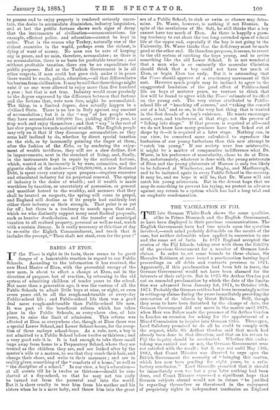BABES AT ETON.
IF the Times is right in its facts, there seems to be great danger of a lamentable reaction in regard to our Public Schools. According to the information it has received, the new Head Master of Eton, with the proverbial energy of the new man, is about to effect a change at Eton, not in the direction of progress, but of reaction, by returning to the old system of admitting children of tender years to the school. Not more than a generation ago, it was the custom of all the Public Schools to admit little boys at nine, or eight, or even seven years old, to all the rough-and-tumble of every-day Public-school life ; and Public-school life then was a good deal more rough-and-tumble than Public-school life now. It was part of the beneficent reform which has taken place in the Public Schools, as everywhere else, of late years, to raise the limit of admission. This reform was effected at Eton as everywhere else, though at Eton there was a special Lower School, and Lower School-house, for the reception of these embryo school-boys. As a rule, now, a boy is not admitted to a Public School before twelve or thirteen ; and a very good rule it is. It is bad enough to take these small imps away from home to a Preparatory School, where they are treated as the children they are, and are looked after by the master's wife or a matron, to see that they comb their hair, and change their shoes, and write to their mammas ; and are in reality given something of the "comforts of a home," as well as "the discipline of a school." In our view, a boy's education— at all events till he is twelve or thirteen—should be conducted at a day-school, so that he may not too early be turned out from the parental roof into the world. But it is sheer cruelty to tear him from his mother and his sisters when he is a mere baby, and throw him into the great
sea of a Public School, to sink or swim as chance may determine. Dr. Warre, however, is nothing if not Etonian. In spite of the revelations of Mr. Salt, he still thinks that a boy cannot have too much of Eton. As there is happily a growing tendency to cut short the too long extended span of school life at the upper end, especially if the boy is not going to the University, Dr. Warre thinks that the deficiency must be made good at the other end. He therefore proposes, it seems, to revert to the old system of catching the boys young, and to revive something like the old Lower School. It is not wonderful that a man who is so eminently the muscular Christian should think that a boy could not have too much of Eton, or begin Eton too early. But it is astounding that the Times should approve of a reactionary movement of this sort. However much people may be inclined to agree in the exaggerated laudation of the good effect of Public-school life on boys of maturer years, we venture to think that few will be found to agree with the Times' estimate of its effect on the young cub. The very virtue attributed to Publicschool life of "knocking off corners," and "taking the conceit out of a lad," and so on, is the very last thing that is wanted in the first decade of a boy's existence. He wants encouragement, care, and tenderness at that stage, not the process of "licking into shape." If that process is required at all—and we do not know how many geniuses have been licked out of shape by it—it is required at a later stage. Nothing can, in our view, be conceived more calculated to reproduce the barbarism of our young barbarians than this new attempt to "catch 'em young." If our society were less aristocratic, it might be a matter of comparative indifference what Dr. Warre, in his preference of muscularity, chose to do at Eton. But, unfortunately, whatever is done with the young aristocrats of Eton and the young plutocrats of Harrow is only too likely to be followed at Winchester, and Rugby, and Marlborough. and to be imitated again in every Public School in the country. It may be, and we hope it will be, that Dr. Warre will not catch his young aristocrats. But in the devout hope that we may do something to prevent his trying, we protest in advance against any return to a system which has had a long trial and an emphatic condemnation.






































 Previous page
Previous page